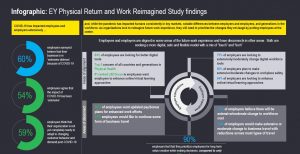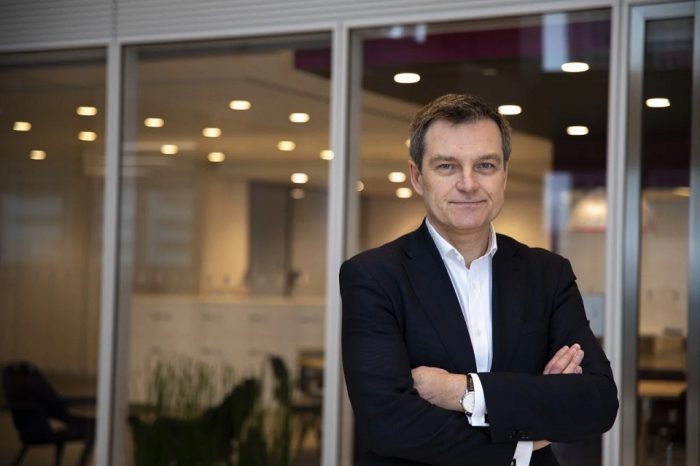EY’s Physical Return to Work Reimagined (PRWR) study finds that 60% of employers believe that their business is in “great difficulty” because of pandemic

COVID-19 has significantly changed the labor market, disrupting the way organizations manage their businesses and forcing the overnight adoption of solutions that were more related to latent trends. As they began to get used to the new reality, the question “what’s next” arose? To understand what the new normal looks like, EY conducted the Physical Return to Work Reimagined (PRWR) study on its own crowd-sourcing platform MillionYou, between June and July 2020, on a sample of over 700 employers in the US, UK and Europe.
The EY study finds the strong impact of the pandemic on both employees and employers: 60% of employers consider their business to be in “great difficulty”, and 54% of employees say they are very affected by changes in this period. In addition, 59% of employees believe that the organizations they work for are not yet ready to adapt to the requirements and behaviors of post-pandemic customers.
 In detail, the study looked at changes in six key areas of the labor market:
In detail, the study looked at changes in six key areas of the labor market:
- Real estate footprint: 74% of companies surveyed said they were planning significant changes to their office buildings.
- Business travel and mobility: 74% of companies expect to substantially change their business travel policy and approach.
- Learning and development: 75% of companies aim for significant changes in the development of employees’ skills, mainly through the development of distance learning platforms.
- Labor management: 49% of companies want to change the way they measure their employees’ productivity.
- Work from home and technology: 79% of companies are looking for equipment that allows employees to work better from home.
Work flexibility: 78% of companies plan for significant changes in home work policy. Working with others, however, remains a key element of the employees’ experience, which lacks the social aspect of being with colleagues. Thus, when asked “Why would you like to return to the office?”, In the first place in the hierarchy of answers provided by employees is “I want to remain socially integrated”. On the other hand, employees express interest in maintaining a certain level of telework, even if this option did not exist before the pandemic: 63% of employees who did not work remotely before COVID-19 want to work from home at least at least one day a week.
Looking ahead, among the industries analyzed, technology and banking companies are most determined to make radical changes to survive the COVID-19 crisis. Over 50% of them stated this intention. Organizations in the other sectors analyzed, whether service providers (such as health services, insurance, professional services), or productive or retail sectors, opt in a significantly smaller number in favor of radical changes (approximately 30% of responding companies declaring themselves ready ), thus preferring a “follow-up and waiting” approach.
The study shows that 38% of employees want a salary increase or an improvement in bonus plans, as a result of the efforts they have made since the onset of the health crisis.
This statement is correlated with the statement of 47% of employees, who say that their productivity has increased during this period; the greatest increase in efficiency is mentioned in the responses of representatives of Generations Y – persons born between 1980 and 1996, and Z – persons born between 1996 and 2010. This expectation of an increase in the level of compensation is not, however, met by the intentions of the companies. : 77% of organizations expect significant reductions in labor costs.
Asked about the worries they felt during this period, between 50 and 70% of employees placed in the first places the personal financial situation, their job, their health, the situation of their loved ones, but also the evolution of the country’s economy. Without significant variations between countries in terms of employees’ fears, the EY study found generational differences instead. Thus, 72% of the respondents of the baby-boomers generation (people born after the war until 1965) are more interested in the economy (15-20% higher than the other generations analyzed) and less in their own job (46 % of these employees are worried about job loss, about 15% less than those from other generations).
“Life goes on as we draw it ourselves. Therefore, I think it is time to let the vision guide us, especially since, at this point, we do not have the foundations we have previously tested to make decisions. In addition, the organizational culture and work climate are now in imbalance and it is up to us to stabilize them. In implementing the new vision we can take into account a flexibility of the workplace – the topic of the day – but also of the program, the type of work schedule, as well as, in general, the way of contracting work and drawing individual or collective responsibilities ”, concluded Horațiu Cocheci, Director, People Advisory Services, EY Romania













